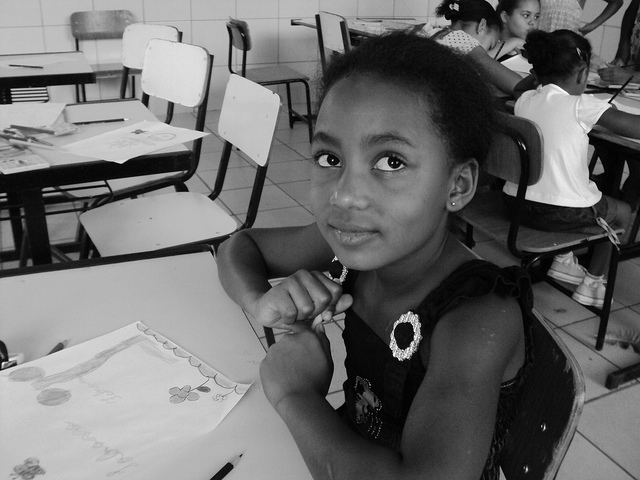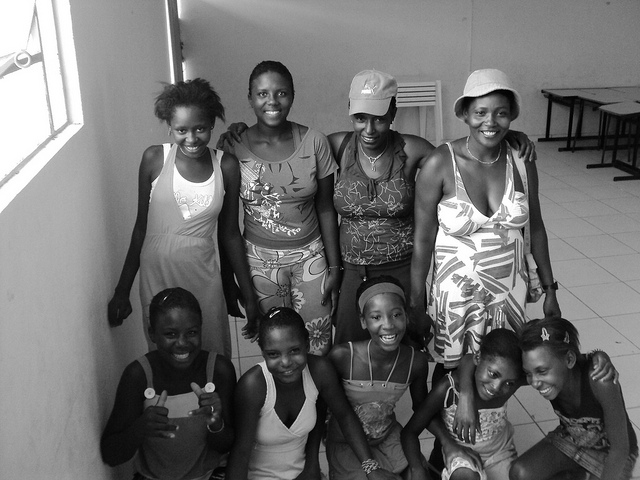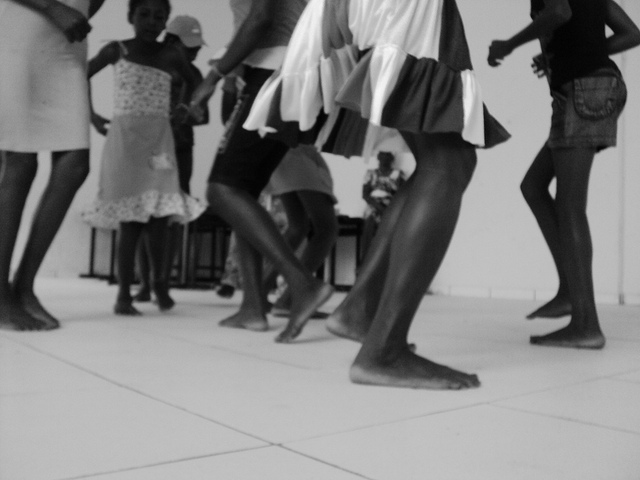[All links lead to Portuguese language pages except when otherwise noted.]
For the first time in Brazilian history, the national census has shown that the majority of the population, 50.7% of a total 190,732,694 people, is black or mixed race. The 2010 census revealed that most of the black population is concentrated in the north and northeast of the country, and that it has the highest rate of illiteracy among the over-15 age group (between 24.7% and 27.1%).
Research has shown that there is still marked inequality in terms of income throughout the country, with the richest strata of society earning 42 times more than the poorest. Half of the Brazilian population lives on less than 375 reais per month [approximately USD $200], an amount less than the minimum wage (510 reais [approximately USD $275] at the time that the studies were carried out). Of the 16.2 million people living in extreme poverty (approximately 8.5% of the population), which is classified as having an income of 70 reais [approximately USD $38] per month or less, 70.8% are black.
In short, the average wages for black and mixed race Brazilians are 2.4 times lower than those earned by citizens of white and Far Eastern origin. In addition to this, they die younger as a result of difficult living conditions, violence and poor access to healthcare. Released on the eve of Black Awareness Day [en], these figures give rise to concerns about the situation of the Brazil's black population.

Photo by Jean Marconi, taken at Cavalcante (Goiás), published on Flickr with a Creative Commons licence (CC BY-NC-SA 2.0).
Some people believe that the black population is actually even larger, as race is often confused with skin colour in Brazil. Marcelo Paxu recounts the conversation that he had with the researcher when his turn came to respond to the census:
- Qual a sua cor????
Eu perguntei o que ele achava e ele respondeu que eu é que tinha que responder qual cor eu preferia, respondi que preferia AZUL, ele então mudou a pergunta….
– Qual é a sua raça??
Respondi que era Negro ele me olhou de cima abaixo e indagou:
– Mas o Sr.é branco!!!!!!!!
Eu irritado respondi: …Meu amigão sei que não tem culpa, mas vou lhe explicar uma coisa…..sou neto de NEGRA, filho de NEGRA ,irmão de NEGRA e meu tio avó era tão PRETO que chegava a ser AZUL (cor que tinha dito a ele que mais gostava) e você ainda acha que sou branco??????
I asked what he meant, and he answered that I should respond by saying which colour I preferred to put down. When I said that I preferred blue, he changed the question.
‘What race are you?’
I answered that I was black. He looked me up and down, and then burst out, ‘But you’re white!’
Irritated, I replied, ‘Mate, I don’t blame you, but I’m going to explain something to you: I’m the grandson of a black woman, the son of a black woman, the brother of a black woman, and my great-uncle was so black that he was practically blue (the colour that I had said was my favourite), and now you’re telling me that I’m white?’
Mulling over the figures in a post to mark Black Awareness Day, Lari Carvalho talks about an increase in awareness, although not necessarily amongst the black population:
Na realidade, a consciência da importância da cultura africana para a história nacional, bem como o orgulho do brasileiro de ser descendente de negros têm aumentado nos últimos anos.
Prova disso são os resultados do último censo do IBGE, que indicam que a proporção de brasileiros que se definem como negros ou pardos aumentou de 44,7% para 50,7%, desde 2000. […]
O grande avanço que o resultado do último censo revela é a consciência da valorização da própria identidade entre os afro-brasileiros.
The fact is that awareness of the importance of African culture in our national history and Brazilians’ pride in their black origins have increased in recent years.
This is borne out by the results of the last census, which show that the proportion of Brazilians describing themselves as black or mixed race has increased from 44.7% to 50.7% since 2000.
This means that for the very first time since the census was first carried out, the official statistics show that black and mixed race citizens make up the majority of the Brazilian population.
The major change revealed by the last census is the way in white African Brazilians are showing an awareness of the value of their own identity.
Lays Santos is bemused that in a country where the majority of the population identifies itself as black, there is a need for a specific day to draw attention to black awareness. She thinks that “something must be wrong if we’re finding ourselves “obliged” to celebrate this day“:
[…] a sua essência está justamente em chamar atenção para inserção do negro na sociedade brasileira. Logo, podemos imaginar que ainda a população negra sofre desvantagem quando o assunto é o exercício da cidadania.
Claro que sim. Infelizmente esse problema das relações raciais no Brasil que influenciam na construção do ser social e no exercício da cidadania, está camuflado pelo mito da Democracia racial. Onde se acredita não haver desigualdade social devido à diferença étnico-racial. Quando na verdade, as estatísticas nos mostram o contrário. Como entender que a maioria da população é discriminada pela sua origem cultural? Como entender que o povo que ajudou a construir nosso país seja ainda discriminado por causa da cor da pele? Não é o Brasil um país de todos? Ao menos devia ser… O censo 2010 mostrou que ainda a desigualdade social está ainda associada a cor da pele. E isso precisa ser combatido com urgência!
[…] In essence, the precise purpose of this day is to draw attention to the inclusion of black people in Brazilian society. This leads us to suppose that the black population still suffers from disadvantages when it comes to exercising their citizenship.
This is clearly the case. Unfortunately, this problem of race relations in Brazil, which has an impact on social identity and citizenship, is camouflaged by the myth of racial democracy – the belief that there is no social inequality based on ethnic or racial differences. In reality, however, the statistics show us that the opposite is true. It is hard to comprehend how the majority of the population is discriminated against due to their cultural background, or how the people who helped to build our country are still discriminated against on the basis of their skin colour. Isn’t Brazil a country for everyone? It certainly should be! The 2010 census showed that social inequality is still linked to skin colour. We urgently need to fight this state of affairs.

Photo by Jean Marconi, taken in Cavalcante (Goiás), published on Flickr with a Creative Commons licence (CC BY-NC-SA 2.0).
Clecyo considers the results of the census, racial prejudice and the living conditions of the black population in a long, thoughtful post, which begins and ends as follows:
No dia da Consciência Negra, quero esquecer das inúmeras vezes que a cor da minha pele foi critério de julgamento. Quero esquecer que os números de uma pesquisa indicam que 97% dos brasileiros dizem não ter preconceito racial, mas também que 98% dos mesmos entrevistados disseram conhecer outras pessoas que tinham. Se pudesse, queria saber como ficar transparente, de vergonha. […]
E neste dia Consciência Negra, queria realmente esquecer que dos 16 milhões de brasileiros vivendo em extrema pobreza (ou com até R$ 70 por mês), 4,2 milhões são brancos e 11,5 milhões são pardos ou pretos. E esquecer também que as mortes entre os brancos estão mais concentradas nas idades avançadas, como resultado de câncer. Porque entre os brasileiros negros, morre-se mais entre os jovens de 15 a 29 anos, principalmente entre os homens, por conta de causas externas, como acidentes e mortes violentas. Minha memória me questiona porque apenas dos 10% de brasileiros mais ricos, apenas 20% são negros, ou porque na base da pirâmide social, 73% dos negros fundamentam os 10% dos brasileiros mais pobres.
On Black Awareness Day, I want to forget about the countless times that I have been judged on my skin colour. I want to forget that the study shows that 97% of Brazilians claim that they do not harbour any racial prejudice, yet 98% of the same interviewees say that they know other people who do. If only it were possible, I would like to be able to turn transparent, out of shame. […]
Today, on Black Awareness Day, I also really want to forget that of the 16 million Brazilians who are living in extreme poverty, on less than 70 reais a month, 4.2 million are white, while 11.5 million are mixed race or black. I also want to forget that white deaths are concentrated in old age, as a result of cancer, whereas more black Brazilians die as young people, especially men in the 15–29 age group, due to external causes such as accidents or violent death. I don’t want to remember that of the richest 10% of Brazilians, only 20% are black, while at the bottom of the social pyramid the poorest 10% of Brazilians comprise 73% of the country’s black people.

Photo by Jean Marconi, taken in Cavalcante (Goiás), published on Flickr with a Creative Commons licence (CC BY-NC-SA 2.0).
Researchers from the Instituto Brasileiro de Geografia e Estatística (IBGE) visited 67.5 million households in 5,565 towns from August to October last year. The very first Brazilian census was carried out in 1872, with the population classified in only two groups: free people and slaves. The latter group, comprising indigenous people and the descendents of African citizens, made up 15% of the population.
Black Awareness Day is celebrated on 20 November, a date chosen in honour of Zumbi dos Palmares [en], a symbol of black resistance and the struggle for freedom, who died on this day in 1695.







12 comments